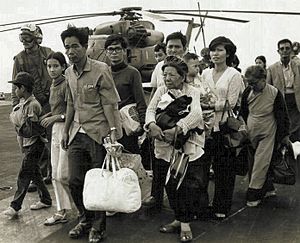m (→Past operations: Remove some templates. interwiki links, delink non military terms, cleanup and move Wikipedia link above categories) |
m (→United Kingdom: Remove some templates. interwiki links, delink non military terms, cleanup and move Wikipedia link above categories) |
||
| Line 36: | Line 36: | ||
==United Kingdom== |
==United Kingdom== |
||
| − | *2000 - [[Operation Palliser]] - evacuation of UK, [[European Union|EU]], and |
+ | *2000 - [[Operation Palliser]] - evacuation of UK, [[European Union|EU]], and Commonwealth citizens from [[Sierra Leone]] |
*2006 - Operation Highbrow - evacuation of UK citizens during the [[2006 Lebanon War]], via [[Cyprus]] |
*2006 - Operation Highbrow - evacuation of UK citizens during the [[2006 Lebanon War]], via [[Cyprus]] |
||
Revision as of 08:04, 18 March 2014

South Vietnamese refugees arrive on a U.S. Navy vessel during Operation Frequent Wind in 1975.
A non-combatant evacuation operation (NEO) is an operation conducted to evacuate civilians from another country, generally due to a deteriorating security situation.
United States of America
According to United States Military Joint Publication 3-68, Noncombatant Evacuation Operations:
- "Noncombatant evacuation operations (NEOs) are conducted to assist the Department of State (DOS) in evacuating noncombatants, nonessential military personnel, selected host-nation citizens, and third country nationals whose lives are in danger from locations in a host foreign nation to an appropriate safe haven and/or the United States.
- NEOs usually involve swift insertions of a force, temporary occupation of an objective, and a planned withdrawal upon completion of the mission.
- During NEOs, the US Ambassador is the senior authority for the evacuation and is ultimately responsible for the successful completion of the NEO and the safety of the evacuees. The Ambassador speaks with the authority of the President and serves as direct representative on site."
This means that at times American citizens may become endangered in locations outside of the United States. This is usually due to civil unrest or war. However, it may also be due to a natural disaster. The U.S. Ambassador has the responsibility, according to law, to request a NEO. Once he does, the government will determine whether or not the evacuation should be done with civilian resources, such as the Civil Reserve Air Fleet (CRAF), or with military forces. Even if military forces conduct the evacuation, the Ambassador remains in charge of the evacuation.
The method of evacuation could include sealift, airlift, or even by road.
Past operations
- 1975 - Operation Frequent Wind - Fall of Saigon, Vietnam War
- 1976 - Operation Fluid Drive - Lebanese Civil War
- 1990 - Operation Sharp Edge - Liberia
- 1991 - Operation Eastern Exit - Somalia
- 1991 - Philippines (Mount Pinatubo) Mount Pinatubo#Evacuations
- 1992 - Operation Silver Anvil - Sierra Leone
- 1994 - Operation Tiger Rescue - Yemen
- 1996 - Operation Assured Response - Liberia
- 1996 - Operation Quick Response - Central African Republic
- 1997 - Operation Silver Wake - Albania
- 1997 - Operation Noble Obelisk - Sierra Leone
- 1998 - Operation Safe Departure - Eritrea
- 1998 - Operation Shepard Venture - Guinea-Bissau
- 2002 - Operation Shepard Sentry - Central African Republic
- 2002 - Operation Autum Return - Côte d'Ivoire
- 2002 - Operation Shining Express - Liberia
- 2006 - 2006 Lebanon War
- 2011 - Libya, Tunisia, Japan
United Kingdom
- 2000 - Operation Palliser - evacuation of UK, EU, and Commonwealth citizens from Sierra Leone
- 2006 - Operation Highbrow - evacuation of UK citizens during the 2006 Lebanon War, via Cyprus
Republic of Ireland
- 2011 - evacuation of Irish citizens during the Libyan civil war, via Malta
References
The original article can be found at Non-combatant evacuation operation and the edit history here.